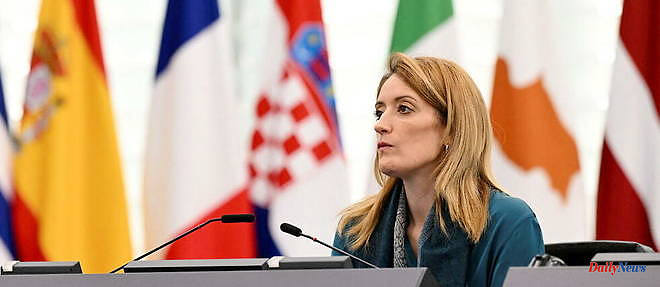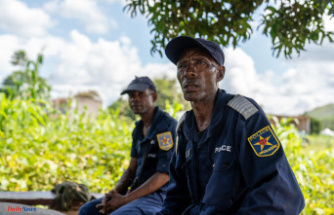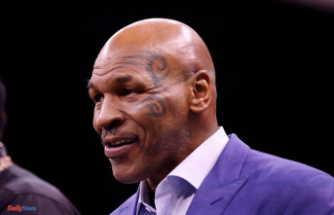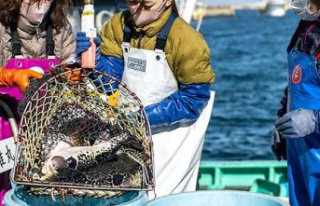Two months after Qatargate and Marocgate, the President of the European Parliament, Roberta Metsola, initiated the reform of the European Parliament's ethical rules. Not without some resistance from its own troops, the Christian Democrats of the EPP, in no hurry to pay for the broken pot of a scandal which was born among European socialists and from a fake NGO of a former socialist deputy ( Pier Antonio Panzeri, now in prison with the status of repentant). Parliament is still awaiting, with apprehension, the wave of revelations promised by the repentant…
Belgian justice is taking its time, but has already jailed MPs Marc Tarabella and Andrea Cozzolino, who, according to Panzeri's accusations, would have accepted cash in exchange for favours. Marc Tarabella, who claims his innocence, asks for his release which will be examined Thursday, in Brussels, before the Council Chamber. According to his lawyer, Mr. Toller, nothing during Tarabella's hearing was able to corroborate Panzeri's accusations. “It is the word of a criminal, Panzeri, against the word of a man who has been honest all his life, Marc Tarabella, continues master Toller. Self-serving and handsomely rewarded speech should never be enough to put someone in jail and potentially destroy their life. »
Roberta Metsola must absolutely restore the credit of the European Parliament before the European elections. His skill and his determination to take up this challenge can also consolidate his stature within the EPP where his ambitions for higher functions are not ignored by anyone. Manfred Weber, the president of the party and leader of the EPP group, has also clearly indicated that the Christian Democrats have, to date, two candidates to be the future head of the EPP list in the European elections, Roberta Metsola and Ursula von der Leyen, the outgoing President of the Commission.
Qatargate can therefore be both a springboard or a shipwreck for Roberta Metsola. If she succeeds in tightening the ethical rules of the European Parliament as it should, she can consider staying in the race until next January, when the EPP will appoint its head of the European list. If she fails, her European career could end in less than two years… She only had a few weeks to shake up the big house, whose ethical rules are quite weak.
Paradoxically, Metsola must first violate his own party. Some EPP MEPs expressed, indeed, doubts in strong terms last week during the group's meeting. Marian-Jean Marinescu, a Romanian MP, particularly distinguished himself by criticizing point 10 of President Metsola's proposals. This is to make training mandatory for parliamentary assistants on financial rules, compliance, conduct and whistleblowing. But will an employee (the assistant) be asked to report their boss (the deputy)?
Marinescu, who was prefect under Caucescu, saw in it the establishment of a kind of private militia and, in a tone of scathing humor, said that he knew if necessary "old Securitate who could take charge of the training of parliamentary assistants". He added, still in the same scathing mode, that his German colleague Andreas Schwab must certainly also have known trainers from the ex-Stasi…
Conflict-abhorring EPP Group leader Manfred Weber preferred to leave the dirty work to Roberta Metsola. It is up to the deputies who do not agree to propose their corrections in the various working groups that have been set up. Because this is another peculiarity of the European Parliament: from a single scandal, there are already three groups of elected officials working at different levels! The machine creates machines…
Impossible to reform the ethical rules without consulting the Ethics Committee. Today, it only has an advisory role at the disposal of the Presidency of Parliament. Seized by President Metsola during a breach of discipline, he investigates the case and proposes a decision. But in the end, Roberta Metsola is not obliged to follow his advice and exercises disciplinary power alone. It will be noted that there is no adversarial procedure or right of defense. Perhaps the current reform will result in giving the Ethics Committee a greater role in respecting the rights of the defence.
Officially, the Parliamentary Commission INGE 2 (on foreign interference) has been seized and must draw up, in the longer term, proposals for reform. His mandate was voted by Parliament. Chaired by Raphaël Glucksmann, the INGE 2 Commission must be completed before the summer. But since there will be changes to the rules of procedure, the AFCO committee (constitutional affairs) will have to agree. "We will have a first draft to discuss in March," promises Glucksmann.
The Conference of Political Group Presidents (the CoP) is not, however, divested. Under the chairmanship of Roberta Metsola, a working group was set up within the CoP. The three main formations, PPE, S
"Roberta Metsola wants to impose her agenda on a recalcitrant EPP," said MP Pascal Durand. She needs to circumvent the most conservative of the PPE. Among them, the very powerful vice-president Rainer Wieland, CDU, lawyer in Stuttgart, who, in the name of the "freedom of mandate", does not want to hear about new constraints weighing on the deputies, nor on the transparency of their appointment, nor on the details of the money order fees. The Renew elected officials are camped on the development of an independent ethical body on the model of the HATVP (High Authority for the transparency of public life) which can sift through all the European institutions.
But the European Parliament has no control over the parliamentary initiative. It is up to the European Commission to put a proposal on the table. Commissioner Vera Jourova, in charge of Transparency, announced on Tuesday 14 February in Strasbourg that the Commission would publish "in the coming weeks" its proposal for an "interinstitutional ethical body" which will apply to all the institutions ( Commission, Parliament, Council) and the bodies mentioned in Article 13 of the Treaty on European Union (Court of Justice of the EU, European Central Bank and European Court of Auditors). "We are in the process of writing this proposal and we are in contact with the other institutions to come up with something that makes sense and is feasible," Vera Jourova continued.
This presupposes clear and common rules, identical control mechanisms, but that "the differences between the institutions and the balance between them are respected". It is not certain, at this stage, that this common ethical body will be endowed with great investigative powers. It seems that the Commission is moving towards a minimum reform proposal with a common body which would only have the power of recommendation with a view to bringing codes of conduct closer together. At this time, it is not excluded that the mountain of Qatargate gives birth to a mouse.












